2014年6月英语六级翻译真题及参考译文:中国热词
2014年6月英语六级翻译真题及译文(新东方版)
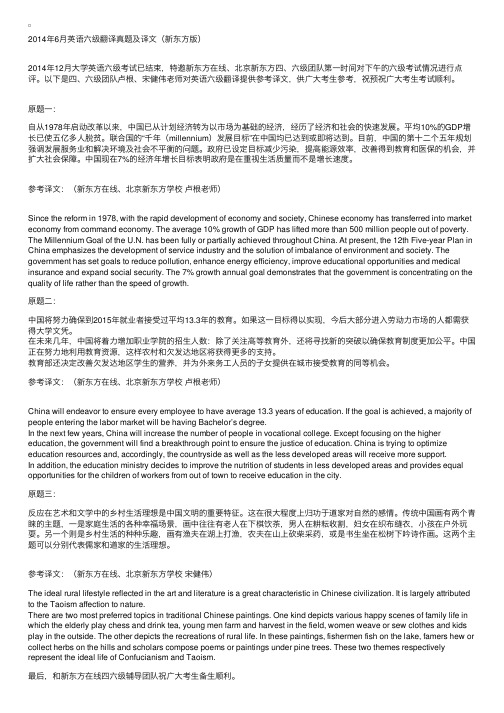
2014年6⽉英语六级翻译真题及译⽂(新东⽅版)2014年12⽉⼤学英语六级考试已结束,特邀新东⽅在线、北京新东⽅四、六级团队第⼀时间对下午的六级考试情况进⾏点评。
以下是四、六级团队卢根、宋健伟⽼师对英语六级翻译提供参考译⽂,供⼴⼤考⽣参考,祝预祝⼴⼤考⽣考试顺利。
原题⼀:⾃从1978年启动改⾰以来,中国已从计划经济转为以市场为基础的经济,经历了经济和社会的快速发展。
平均10%的GDP增长已使五亿多⼈脱贫。
联合国的“千年(millennium)发展⽬标”在中国均已达到或即将达到。
⽬前,中国的第⼗⼆个五年规划强调发展服务业和解决环境及社会不平衡的问题。
政府已设定⽬标减少污染,提⾼能源效率,改善得到教育和医保的机会,并扩⼤社会保障。
中国现在7%的经济年增长⽬标表明政府是在重视⽣活质量⽽不是增长速度。
参考译⽂:(新东⽅在线、北京新东⽅学校卢根⽼师)Since the reform in 1978, with the rapid development of economy and society, Chinese economy has transferred into market economy from command economy. The average 10% growth of GDP has lifted more than 500 million people out of poverty. The Millennium Goal of the U.N. has been fully or partially achieved throughout China. At present, the 12th Five-year Plan in China emphasizes the development of service industry and the solution of imbalance of environment and society. The government has set goals to reduce pollution, enhance energy efficiency, improve educational opportunities and medical insurance and expand social security. The 7% growth annual goal demonstrates that the government is concentrating on the quality of life rather than the speed of growth.原题⼆:中国将努⼒确保到2015年就业者接受过平均13.3年的教育。
2014年6月大学英语六级考试真题(三)

2014年6月大学英语六级考试真题(三)In June 2014, the CET-6 (College English Test Level 6) was held across China. As one of the most important English proficiency tests for Chinese college students, it assesses students' abilities in listening, reading, writing, and translation.The test consists of four parts: listening comprehension, reading comprehension, writing, and translation. For listening comprehension, students are required to listen to a recording and answer multiple-choice questions based on what they have heard. The reading comprehension section tests students' ability to understand and analyze English texts, including both articles and passages.In the writing section, students are asked to write an essay on a given topic within a certain time frame. This part aims to test their ability to express their ideas clearly and logically in written English. The final part of the test is translation, where students need to translate a passage from Chinese into English. This tests their understanding of both languages and their ability to transfer meaning accurately.Overall, the CET-6 is considered a challenging test that requires students to have a strong grasp of English grammar,vocabulary, and comprehension skills. Many students spend months preparing for the exam by studying English textbooks, practicing listening and reading exercises, and improving their writing and translation skills.The results of the CET-6 are important for students looking to apply for graduate programs, scholarships, or jobs that require English proficiency. A good score can open up many opportunities for students in their academic and professional careers.In conclusion, the 2014 June CET-6 exam was a significant event for thousands of college students in China. It tested their English language abilities and provided them with an opportunity to demonstrate their proficiency in the language. For many students, passing the CET-6 is a major achievement and a stepping stone towards their future goals.。
2014年6月大学英语六级真题及-答案完整版
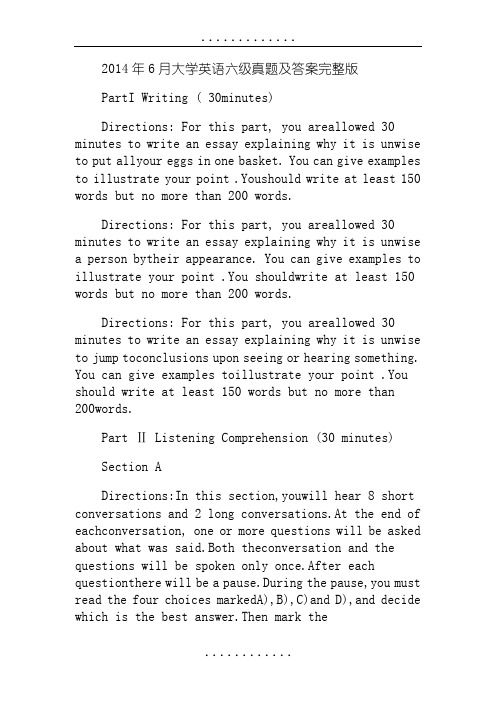
2014年6月大学英语六级真题及答案完整版PartI Writing ( 30minutes)Directions: For this part, you areallowed 30 minutes to write an essay explaining why it is unwise to put allyour eggs in one basket. You can give examples to illustrate your point .Youshould write at least 150 words but no more than 200 words.Directions: For this part, you areallowed 30 minutes to write an essay explaining why it is unwise a person bytheir appearance. You can give examples to illustrate your point .You shouldwrite at least 150 words but no more than 200 words.Directions: For this part, you areallowed 30 minutes to write an essay explaining why it is unwise to jump toconclusions upon seeing or hearing something. You can give examples toillustrate your point .You should write at least 150 words but no more than200words.Part Ⅱ Listening Comprehension (30 minutes)Section ADirections:In this section,youwill hear 8 short conversations and 2 long conversations.At the end of eachconversation, one or more questions will be asked about what was said.Both theconversation and the questions will be spoken only once.After each questionthere will be a pause.During the pause,you must read the four choices markedA),B),C)and D),and decide which is the best answer.Then mark thecorrespondingletter on Answer Sheet1 with a single line through the centre.注意:此部分试题请在答题卡1上作答。
2014年6月英语六级真题(含答案)中文对照

2014 年年英语六级真题A 节方向:在本节中,你将听到8 短对话和 2 长时间谈话。
注意:此部分试题请在答题卡1上作答。
他们可能是赃物的 1.A)B)他们可能是假冒产品C)他们可能是有缺陷的产品D)他们可能好走私2.A) 他们是公务员B)他们是求职者C)他们都是记者D)他们是公众演讲3.A)人已决定辞去他的电脑课B)女人想要获得学位的管理C)计算机学位是一个必须为行政工作D)男人去换他的计算机课的时间4.A)大量的参赛者参加演出B) 第五届的参赛者赢得了最高奖C)那不是如他所预期的一样令人兴奋D)它是由一个汽车制造商赞助5.)阅读报纸专栏B)看着一张火车时刻表C)驾驶从纽约到波士顿D)等待在机场的人6.)他穿着一件外套,在商场里买了B)他在理发店里得到一份新工作C)他了一根手指,昨晚受伤D)他昨天剪了头发7.)他不能欣赏毕加索的画展B)甚至是他的外甥可以抽奖,毕加索C)他不是对现代绘画印象颇深D)一些图纸由幼儿园的小朋友都是优秀8.A)他不应该本末倒置B)他的行为不符合他的话C)他向学生政府的态度已经改变了D)他很久以来参与学生会9 到11 的问题都基于你刚才听到的谈话9.A)她离开她自己的车停在曼彻斯特B)什么地方出毛病用她的车C)她想要在周末去旅行D)她车上拿下,t 是早在一周的时间10.A)安全B)大小C)安慰D)成本11.A)第三方保险B)增值税C)汽油D)车损险问题12 到15 基于你刚才听到的谈话12.A)如何更新基本设施B)怎样做才能提高他们的地位C)在哪里可以找到他们的植物D)如何吸引投资13.A) 他们与其他欧洲国家联系的路是快速B)他们都设在法国南部C)他们都非常靠近彼此D)其基本的设施都很好懂得可真) 尽量避免作出草率的决定B)利用到列车链接C)与地方当局的谈话D)先进行田野调查15.A) 未来产品分布B)本地工人的就业政策C)公路和铁路的链接,为小城镇的D)熟练的员工队伍,丘陵区B 节方向:在这部分中,你会听到 3 短的段落。
2014年6月大学英语六级真题及答案真题+听力原文+答案详解.docx

2014 年 6 月英语六级真题及答案Part I WritingDirections: For this part, you are allowed 30 minutes to write a short essay on the topic of Due Attention Should Be Given to the Study of Chinese Yo u should write at Chinese. least 120 words following the outline given belo w:1.近年来在学生中出现了忽视中文学习的现象;2.出现这种现象的原因和后果;3我认为,Given Due Attention Should Be Given to the Study of ChinesePart II Reading Comprehension (Skimming and Scanning) (15 minute s)Directions: In this part, you will have 15 minutes to go over the passage qu ickly and answer the questions on Answer sheet 1. For questions 1-7, choo se the best answer from the four choices marked A), B), C) and D). For qu estions 8-10, complete the sen-tences with the information given in the pas sage. Welcome,Freshmen. Have an iPod.Taking a step that many professors may view as a bit counterproductive, so me colleges and universities are doling out Apple iPhones and Internet-cap able iPods to their students.The always-on Internet devices raise some novel possibilities, like tracking where students gather together. With far less controversy, colleges could s end messages about canceled classes, delayed buses, campus crises or just the cafeteria menu.While schools emphasize its usefulness —online research in class and inst ant polling of students, for example — a big part of the attraction is, undou btedly, that the iPhone is cool and a hit with students. Being equipped with one of the most recent cutting-edge IT products could just help a college o r university foster a cutting-edge reputation.Apple stands to win as well, hooking more young consumers with decadesof technology pur- chases ahead of them. The lone losers, some fear, could be professors.Students already have laptops and cell phones, of course, but the newest de vices can take class distractions to a new level. They practically beg a user to ignore the long-suffering professor strug- gling to pass on accumulated wisdom from the front of the room — a prospect that teachers find most irr itating and students view as, well, inevitable.“ When it gets a little boring, I might pull it out,‖acknowledged Naomi P ugh, a first-year student at Freed-Hardeman University in Henderson, Ter m., referring to her new iPod Touch, which can connect to the Internet ove r a campus wireless network. She speculated that professors might try even harder to make classes interesting if they were to compete with the devices. Experts see a movement toward the use of mobile technology in educati on, though they say it is in its infancy as professors try to come up with us eful applications. Providing powerful hand- held devices is sure to fuel deb ates over the role of technology in higher education.“ We think this is the way the future is going to work,‖said Kyle Dickson, co-director of re- search and the mobile learning initiative at Abilene Chris tian University in Texas, which has bought more than 600 iPhones and 300 iPods for students entering this fall.Although plenty of students take their laptops to class, they don’t take the m everywhere and would prefer something lighter. Abilene Christian settle d on the devices after surveying students and finding that they did not like hauling around their laptops, but that most of them always carried a cell ph one, Dr. Dickson said.It is not clear how many colleges and universities plan to give out iPhones and iPods this fall; officials at Apple were unwilling to talk about the subje ct and said that they would not leak any institution plans’s.“ We can’t announce other people’s news,‖saidGreg Joswiak, vice presid ent of iPod and iPhone marketing at Apple. He also said that he could not d iscuss discounts to universities for bulk purchases.At least four institutions — the University of Maryland, Oklahoma Christi an University, Abilene Christian and Freed-Hardeman — have announced t hat they will give the devices to some or all of their students this fall.Other universities are exploring their options. Stanford University has hire d a student-run com-pany to design applications like a campus map and dir ectory for the iPhone. It is considering whether to issue iPhones but not sur e it, snecessary, noting that more than 700 iPhones were registered on the u niversity network’s last year.At the Massachusetts Institute of Technology, iPhones might alreadyhave been everywhere, if AT&T, the wireless carrier offering the iPhone in the United States,had a more reliable network, said Andrew Yu, mobile devices platform pro ject manager at M.I.T.“ We would have probably gone ahead with this, maybe just getting a thou sand iPhones and giving them out, ‖Mr. Yusaid.The University of Maryland at College Park is proceeding cautiously, givi ng the iPhone or iPod Touch to 150 students, said Jeffrey Huskamp, vice p resident and chief information officer at the university. ― Wedon’t think tha t we have all the answers, Mr‖. Huskamp said. By observing how students use the gadgets, he said,― We’ retrying to get answers from the students. ‖ At each college, the students who choose to get an iPhone must pay for mo bile phone service. Those service contracts include unlimited data use. Both the iPhones and the iPod Touch devices can connect to the Internet throu gh campus wireless networks. With the iPhone, those networks may provid e faster connections and longer battery life than A T&T’s data network. Many cell phones allow users to surf the Web, but only some newer ones are c apable of wireless connection to the local area computer network. University officials say that they have no plans to track their students (and Apple said it would not be possible unless students give their permission). They say that they are drawn to the prospect of learning applications outsid e the classroom, though such lesson plans have yet to surface.“ My colleagues and I are studying something called augmented reality (a field of computer research dealing with the combination of real-world and virtual reality), said‖ Christopher Dede, professor in learning technologies at Harvard University. ― AlienContact, for‖ example, is an exer- cise develo ped for middle-school students who use hand-held devices that can determi ne their location. As they walk around a playground or other area, text, vid eo or audio pops up at various points to help them try to figure out why ali ens were in the schoolyard.“ You can imagine similar kinds of interactive activities along historical li nes, ‖like following the Freedom Trail in Boston, Professor Dede said.― It’s important that we do research, so that we know how well something like this works. ‖The rush to distribute the devices worries some professors, who say that st udents are less likely to participate in class if they are multi-tasking. ― I ’m n ot someone who’s anti-technology, but I,m always worried that technology becomes an end in and of itself, and it replaces teaching or it replaces analysis,, said’Ellen Millender, associate professor of classics at Reed College in Portland, Ore. (She added that she hoped to buy an iPhone for herself on ce prices fall.)Robert Summers, who has taught at Cornell Law School for about 40 years,announced this week — in a detailed, footnoted memorandum — that he would ban laptop computers from his class on contract law.“ I would ban that too if I knew the students were using it in class, Profes‖sor Summers said of the iPhone, after the device and its capabilities were e xplained to him. ― Whatwe want to encour- age in these students is an activ e intellectual experience, in which they develop the wide range of complex reasoning abilities required of good lawyers. ‖The experience at Duke University may ease some concerns. A few years a go, Duke began giving iPods to students with the idea that they might use t hem to record lectures (these older models could not access the Internet).“ We had assumed that the biggest focus of these devices would be consu ming the content, said‖ Tracy Futhey, vice president for informationtechn ology and chief information officer at Duke.But that is not all that the students did. They began using the iPods to creat e their own ― content, making‖ audio recordings of themselves and presenti ng them. The students turned what could have been a passive interaction in to an active one, Ms. Futhey said. 注意:此部分试题请在答题卡 1 上作答。
2014年6月六级真题及答案-精心整理版

2014年6月英语六级真题及答案(精心整理版)Part I WritingDirections: For this part, you are allowed 30 minutes to write a short essay on the topic of Due Attention Should Be Given to the Study of Chinese Yo u should write at Chinese. least 120 words following the outline given belo w:1.近年来在学生中出现了忽视中文学习的现象;2.出现这种现象的原因和后果;3我认为…Given Due Attention Should Be Given to the Study of ChinesePart II Reading Comprehension (Skimming and Scanning) (15 minute s)Directions: In this part, you will have 15 minutes to go over the passage qu ickly and answer the questions on Answer sheet 1. For questions 1-7, choo se the best answer from the four choices marked A), B), C) and D). For qu estions 8-10, complete the sen-tences with the information given in the pas sage. Welcome,Freshmen. Have an iPod.Taking a step that many professors may view as a bit counterproductive, so me colleges and universities are doling out Apple iPhones and Internet-cap able iPods to their students.The always-on Internet devices raise some novel possibilities, like tracking where students gather together. With far less controversy, colleges could s end messages about canceled classes, delayed buses, campus crises or just the cafeteria menu.While schools emphasize its usefulness —online research in class and inst ant polling of students, for example — a big part of the attraction is, undou btedly, that the iPhone is cool and a hit with students. Being equipped with one of the most recent cutting-edge IT products could just help a college o r university foster a cutting-edge reputation.Apple stands to win as well, hooking more young consumers with decades of technology pur-chases ahead of them. The lone losers, some fear, could be professors.Students already have laptops and cell phones, of course, but the newest de vices can take class distractions to a new level. They practically beg a user to ignore the long-suffering professor strug-gling to pass on accumulated wisdom from the front of the room — a prospect that teachers find most irr itating and students view as, well, inevitable.“When it gets a little boring, I might pull it out,‖ acknowledged Naomi P ugh, a first-year student at Freed-Hardeman University in Henderson, Ter m., referring to her new iPod Touch, which can connect to the Internet ove r a campus wireless network. She speculated that professors might try even harder to make classes interesting if they were to compete with the devices. Experts see a movement toward the use of mobile technology in educati on, though they say it is in its infancy as professors try to come up with us eful applications. Providing powerful hand-held devices is sure to fuel deb ates over the role of technology in higher education.“We think this is the way the future is going to work,‖ said Kyle Dickson, co-director of re-search and the mobile learning initiative at Abilene Chris tian University in Texas, which has bought more than 600 iPhones and 300 iPods for students entering this fall.Although plenty of students take their laptops to class, they don’t take the m everywhere and would prefer something lighter. Abilene Christian settle d on the devices after surveying students and finding that they did not like hauling around their laptops, but that most of them always carried a cell ph one, Dr. Dickson said.It is not clear how many colleges and universities plan to give out iPhones and iPods this fall; officials at Apple were unwilling to talk about the subje ct and said that they would not leak any institution’s plans.“We can’t announce other people’s news,‖said Greg Joswiak, vice presid ent of iPod and iPhone marketing at Apple. He also said that he could not d iscuss discounts to universities for bulk purchases.At least four institutions — the University of Maryland, Oklahoma Christi an University, Abilene Christian and Freed-Hardeman — have announced t hat they will give the devices to some or all of their students this fall.Other universities are exploring their options. Stanford University has hire d a student-run com-pany to design applications like a campus map and dir ectory for the iPhone. It is considering whether to issue iPhones but not sur e it, snecessary, noting that more than 700 iPhones were registered on the u niversity’s network last year.At the Massachusetts Institute of Technology, iPhones might already have been everywhere, if AT&T, the wireless carrier offering the iPhone in the United States,had a more reliable network, said Andrew Yu, mobile devices platform pro ject manager at M.I.T.“We would have probably gone ahead with this, maybe just getting a thou sand iPhones and giving them out,‖ Mr. Yusaid.The University of Maryland at College Park is proceeding cautiously, givi ng the iPhone or iPod Touch to 150 students, said Jeffrey Huskamp, vice p resident and chief information officer at the university. ―We don’t think tha t we have all the answers,‖ Mr. Huskamp said. By observing how students use the gadgets, he said, ―We’re trying to get answers from the students.‖At each college, the students who choose to get an iPhone must pay for mo bile phone service. Those service contracts include unlimited data use. Bot h the iPhones and the iPod Touch devices can connect to the Internet throu gh campus wireless networks. With the iPhone, those networks may provid e faster connections and longer battery life than AT&T’s data network. Many cell phones allow users to surf the Web, but only some newer ones are c apable of wireless connection to the local area computer network. University officials say that they have no plans to track their students (and Apple said it would not be possible unless students give their permission). They say that they are drawn to the prospect of learning applications outsid e the classroom, though such lesson plans have yet to surface.“My colleagues and I are studying something called augmented reality (a field of computer research dealing with the combination of real-world and virtual reality),‖ said Christopher Dede, professor in learning technologies at Harvard University. ―Alien Contact,‖ for example, is an exer-cise develo ped for middle-school students who use hand-held devices that can determi ne their location. As they walk around a playground or other area, text, vid eo or audio pops up at various points to help them try to figure out why ali ens were in the schoolyard.“You can imagine similar kinds of interactive activities along historical li nes,‖ like following the Freedom Trail in Boston, Professor Dede said. ―It’s important that we do research, so that we know how well something like this works.‖The rush to distribute the devices worries some professors, who say that st udents are less likely to participate in class if they are multi-tasking. ―I’m n ot someone who’s anti-technology, but I,m always worried that technology becomes an end in and of itself, and it replaces teaching or it replaces analysis,,’ said Ellen Millender, associate professor of classics at Reed College in Portland, Ore. (She added that she hoped to buy an iPhone for herself on ce prices fall.)Robert Summers, who has taught at Cornell Law School for about 40 years , announced this week — in a detailed, footnoted memorandum —that he would ban laptop computers from his class on contract law.“I would ban that too if I knew the students were using it in class,‖ Profes sor Summers said of the iPhone, after the device and its capabilities were e xplained to him. ―What we want to encour-age in these students is an activ e intellectual experience, in which they develop the wide range of complex reasoning abilities required of good lawyers.‖The experience at Duke University may ease some concerns. A few years a go, Duke began giving iPods to students with the idea that they might use t hem to record lectures (these older models could not access the Internet). “We had assumed that the biggest focus of these devices would be consu ming the content,‖ said Tracy Futhey, vice president for information techn ology and chief information officer at Duke.But that is not all that the students did. They began using the iPods to creat e their own ―content,‖ making audio recordings of themselves and presenti ng them. The students turned what could have been a passive interaction in to an active one, Ms. Futhey said. 注意:此部分试题请在答题卡1上作答。
2014年6月大学英语六级考试真题含答案解析
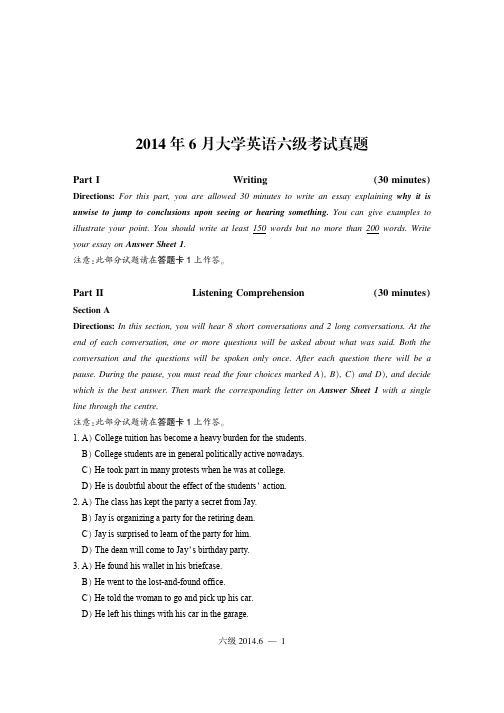
D冤 Train clients to use financial software.
20. A冤 Rewarding.
B冤 Unsuccessful.
C冤 Tedious. 21. A冤 He provided individual support.
D冤 Important.
B冤 He held group discussions.
渊30 minutes冤
Section A
Directions: In this section, you will hear 8 short conversations and 2 long conversations. At the
end of each conversation, one or more questions will be asked about what was said. Both the
D冤 He didn爷t expect to complete his work so soon.
8. A冤 He has failed to register for the course.
B冤 He would like to major in psychology too.
C冤 There should be more time for registration.
18. A冤 To make the building appear traditional.
B冤 To cut the construction cost to the minimum.
C冤 To match the style of construction on the site.
D冤 To embody the subcommittee爷s design concepts.
翻译
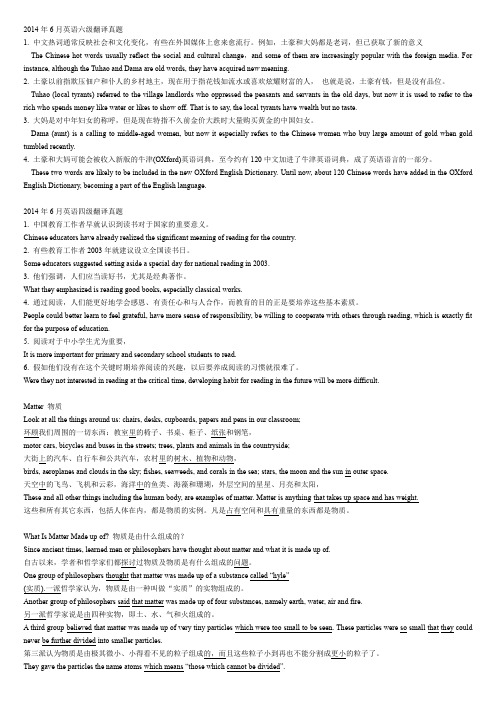
2014年6月英语六级翻译真题1. 中文热词通常反映社会和文化变化,有些在外国媒体上愈来愈流行。
例如,土豪和大妈都是老词,但已获取了新的意义The Chinese hot words usually reflect the social and cultural change,and some of them are increasingly popular with the foreign media. For instance, although the Tuhao and Dama are old words, they have acquired new meaning.2. 土豪以前指欺压佃户和仆人的乡村地主,现在用于指花钱如流水或喜欢炫耀财富的人,也就是说,土豪有钱,但是没有品位。
Tuhao (local tyrants) referred to the village landlords who oppressed the peasants and servants in the old days, but now it is used to refer to the rich who spends money like water or likes to show off. That is to say, the local tyrants have wealth but no taste.3. 大妈是对中年妇女的称呼,但是现在特指不久前金价大跌时大量购买黄金的中国妇女。
Dama (aunt) is a calling to middle-aged women, but now it especially refers to the Chinese women who buy large amount of gold when gold tumbled recently.4. 土豪和大妈可能会被收入新版的牛津(OXford)英语词典,至今约有120中文加进了牛津英语词典,成了英语语言的一部分。
2014年6月大学英语6级真题与答案详解汇总(共三套)完整版
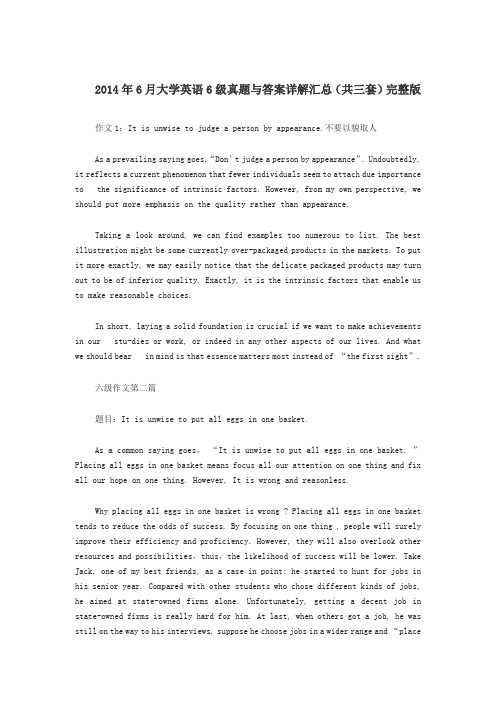
2014年6月大学英语6级真题与答案详解汇总(共三套)完整版作文1:It is unwise to judge a person by appearance.不要以貌取人As a prevailing saying goes,“Don’t judge a person by appearance”. Undoubtedly, it reflects a current phenomenon that fewer individuals seem to attach due importance to the significance of intrinsic factors. However, from my own perspective, we should put more emphasis on the quality rather than appearance.Taking a look around, we can find examples too numerous to list. The best illustration might be some currently over-packaged products in the markets. To put it more exactly, we may easily notice that the delicate packaged products may turn out to be of inferior quality. Exactly, it is the intrinsic factors that enable us to make reasonable choices.In short, laying a solid foundation is crucial if we want to make achievements in our stu-dies or work, or indeed in any other aspects of our lives. And what we should bear in mind is that essence matters most instead of “the first sight”.六级作文第二篇题目:It is unwise to put all eggs in one basket.As a common saying goes,“It is unwise to put all eggs in one basket. ”Placing all eggs in one basket means focus all our attention on one thing and fix all our hope on one thing. However, It is wrong and reasonless.Why placing all eggs in one basket is wrong ? Placing all eggs in one basket tends to reduce the odds of success. By focusing on one thing , people will surely improve their efficiency and proficiency. However, they will also overlook other resources and possibilities,thus,the likelihood of success will be lower. Take Jack, one of my best friends, as a case in point: he started to hunt for jobs in his senior year. Compared with other students who chose different kinds of jobs, he aimed at state-owned firms alone. Unfortunately, getting a decent job in state-owned firms is really hard for him. At last, when others got a job, he was still on the way to his interviews. suppose he choose jobs in a wider range and “placeall eggs in different baskets”, he could have gotten a job much easier. Putting all eggs in one basket in unwise, a truth which is applicable to many situations.As a college student,we should endeavor to master more skills, accumulate different experience and make friends with diverse people.2014年6月英语六级作文题目:看到什么、听到什么就立刻得出结论是不明智的。
2014年6月英语六级翻译练习:中国梦
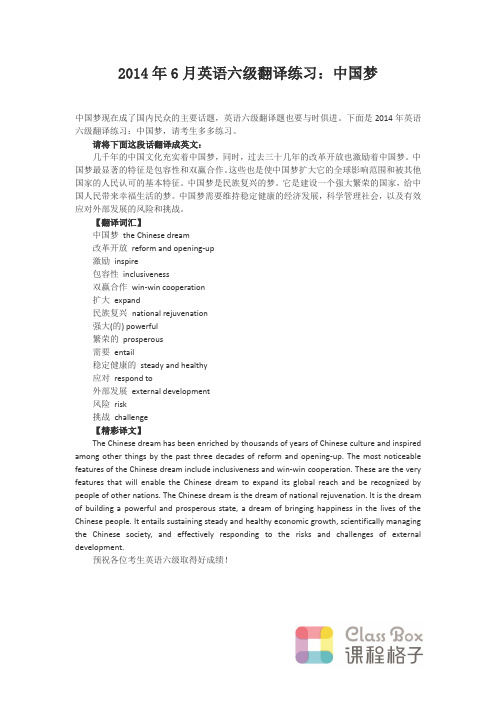
2014年6月英语六级翻译练习:中国梦中国梦现在成了国内民众的主要话题,英语六级翻译题也要与时俱进。
下面是2014年英语六级翻译练习:中国梦,请考生多多练习。
请将下面这段话翻译成英文:几千年的中国文化充实着中国梦,同时,过去三十几年的改革开放也激励着中国梦。
中国梦最显著的特征是包容性和双赢合作。
这些也是使中国梦扩大它的全球影响范围和被其他国家的人民认可的基本特征。
中国梦是民族复兴的梦。
它是建设一个强大繁荣的国家,给中国人民带来幸福生活的梦。
中国梦需要维持稳定健康的经济发展,科学管理社会,以及有效应对外部发展的风险和挑战。
【翻译词汇】中国梦the Chinese dream改革开放reform and opening-up激励inspire包容性inclusiveness双赢合作win-win cooperation扩大expand民族复兴national rejuvenation强大(的) powerful繁荣的prosperous需要entail稳定健康的steady and healthy应对respond to外部发展external development风险risk挑战challenge【精彩译文】The Chinese dream has been enriched by thousands of years of Chinese culture and inspired among other things by the past three decades of reform and opening-up. The most noticeable features of the Chinese dream include inclusiveness and win-win cooperation. These are the very features that will enable the Chinese dream to expand its global reach and be recognized by people of other nations. The Chinese dream is the dream of national rejuvenation. It is the dream of building a powerful and prosperous state, a dream of bringing happiness in the lives of the Chinese people. It entails sustaining steady and healthy economic growth, scientifically managing the Chinese society, and effectively responding to the risks and challenges of external development.预祝各位考生英语六级取得好成绩!。
2014年6月英语六级翻译真题及参考答案
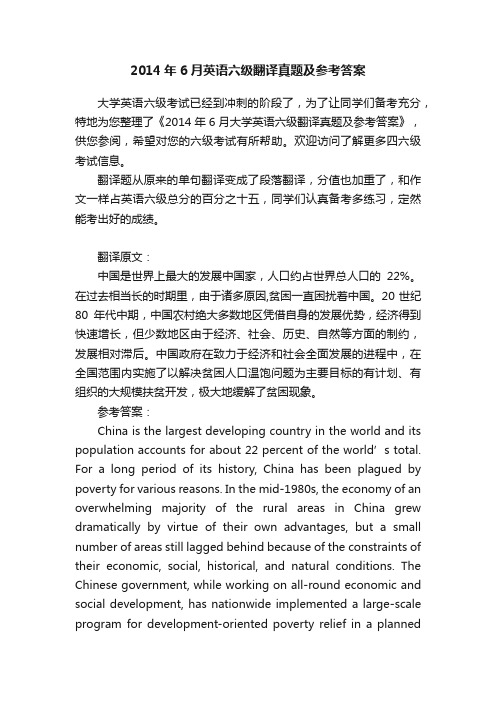
2014年6月英语六级翻译真题及参考答案大学英语六级考试已经到冲刺的阶段了,为了让同学们备考充分,特地为您整理了《2014年6月大学英语六级翻译真题及参考答案》,供您参阅,希望对您的六级考试有所帮助。
欢迎访问了解更多四六级考试信息。
翻译题从原来的单句翻译变成了段落翻译,分值也加重了,和作文一样占英语六级总分的百分之十五,同学们认真备考多练习,定然能考出好的成绩。
翻译原文:中国是世界上最大的发展中国家,人口约占世界总人口的22%。
在过去相当长的时期里,由于诸多原因,贫困一直困扰着中国。
20世纪80年代中期,中国农村绝大多数地区凭借自身的发展优势,经济得到快速增长,但少数地区由于经济、社会、历史、自然等方面的制约,发展相对滞后。
中国政府在致力于经济和社会全面发展的进程中,在全国范围内实施了以解决贫困人口温饱问题为主要目标的有计划、有组织的大规模扶贫开发,极大地缓解了贫困现象。
参考答案:China is the largest developing country in the world and its population accounts for about 22 percent of the world’s total. For a long period of its history, China has been plagued by poverty for various reasons. In the mid-1980s, the economy of an overwhelming majority of the rural areas in China grew dramatically by virtue of their own advantages, but a small number of areas still lagged behind because of the constraints of their economic, social, historical, and natural conditions. The Chinese government, while working on all-round economic and social development, has nationwide implemented a large-scale program for development-oriented poverty relief in a plannedand organized way. With the main objective of helping poverty-stricken people solve the food and clothing problems, this program has gone a long way toward alleviating poverty.难点精析1.发展中国家:英语中对应的表达为developing country,该句结构简单,直译即可。
历年六级翻译真题汇总答案校订版
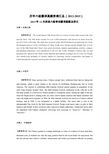
历年六级翻译真题答案汇总(2012-2015)2013年12月英语六级考试翻译真题及译文试卷一:丝绸之路【参考译文】The world-famous Silk Road refers to a series of routes that connects the Eastand the West. The Silk Road extends for over 6,000 kilometers and derived its name from the ancient China’s sil k trade. The trade that occurred on the Silk Road played an important role in the development process of the civilization of China, South Asia, Europe and the Middle East. It is by way of the Silk Road that China’s four great inventions, namely papermaking, powder, compass and printing technology, were introduced to all over the world. Similarly, Chinese silk, tea and porcelain also spread to the whole world. Material and cultural exchanges are two-way, for Europe also satisfied the demands of Chinese market by exporting various commodities and plants to China through the exported various goods and plants through the Silk Road.试卷二:中秋节【参考译文】Since ancient times, Chinese people have celebrated their harvest during themid-Autumn, which is quite similar to the custom of celebrating Thanksgiving Day in North America. The custom of celebrating Mid-Autumn Festival started gaining its popularity in the early Tang Dynasty around China. The Mid-Autumn Festival, celebrated on the 15th day of the 8th lunar month, is a festival for Chinese people to worship the moon. During the night of the day when the bright moon is shining in the sky, there will be family reunions and family members will enjoy the bright moon together. In 2006, the Mid-Autumn Festival was listed as a Chinese cultural heritage, and in 2008, it was designated as a public holiday. The moon cake is seen as the indispensable fine food for the Mid-Autumn Festival. People send moon cakes as gifts to their relatives and friends or they eat moon cakes enjoyed at family gatherings. Traditional moon cakes are imprinted with Chinese characters conveying such meanings as “longevity”, “blessing” or “harmony”.试卷三: 中国园林【参考译文】The Chinese garden is a unique landscape in virtue of evolution of more than threethousand years. It includes not only the large gardens built by the royal family for enjoyment, but also the private ones built by scholars, businessmen and former government officials for gettingrid of the hustle and bustle of the outside world. These gardens constituted a kind of miniaturized landscape which aims at displaying the due harmonious relationship between human and nature. Typical Chinese gardens are surrounded by walls. In the gardens there are ponds, rockworks, trees, flowers and plants, and various architectures that are connected by winding paths or corridors. When rambling in the gardens, people can enjoy a series of elaborately designed landscapes which are presented in front of them like a landscape painting scroll.2014年6月英语六级考试翻译真题及译文试卷一:中国科学院Recently, Chinese Academy of Science recently has published a series of annual reports about its latest scientific discoveries and a blueprint for the coming year. The reports consist of three parts: science development, high-technology development and China’s sustainable development strategy. The first one includes the latest discoveries by Chinese scientists, such as the research of new particle and the breakthrough of the H7N9 virus research. The report also highlights the issues that need to be concerned in the next few years. The second one announces some hot areas of applied science research, for instance, three-D printing and artificial organ research. The last one suggests enhancing top level designs to remove structural barriers arising from industrial upgrading and promote energy conservation and emissions reduction.试卷二:治理污染Beijing has planned to invest 760 billion yuan to tackle pollution in the coming three years, starting from reducing the PM 2.5 emissions. This newly released plan is aimed at reducing four major pollution resources, including the exhaust emissions from more than 5 million motor vehicles, the burning of coals in the surrounding areas, the sandstorms from the North and the local construction dust. Another 85 billion yuan will be used to build or upgrade the facilities for treatment of urban garbage and sewage and additional 30 billion yuan will be invested in forestation in the next three years.The municipal government also plans to set up a group of water recycling factories and curb peccancy buildings in order to improve the environment. In addition, Beijing will punish more severely the behaviors that violate the regulations of emission limitation.试卷三:中文热词Chinese hot words usually reflect social changes and culture, and some of them are becoming increasingly popular in foreign media. Tuhao and dama, for example, are both old words, but they have gained new meanings.Tuhao used to mean landlords in the countryside who oppress their tenants and servants, but now it refers to those who spending money without control or those who like to show off their wealth. That is to say, a tuhao owns a lot of money but has no taste. Dama is used to describe middle-aged women, but now it refers specifically to those Chinese ladies who bought gold in bulk when gold price fell not long ago.The words tuhao and dama may be included in the new Oxford English Dictionary. So far, about 120 Chinese words have been added to Oxford English Dictionary, becoming a part of the English language.2014年12月英语六级考试翻译真题及译文试卷一:经济发展Since the reform was launched in 1978, China has transformed from the planned economy into a market-based economy and undergone rapid economic and social development. An average GDP growth rate of 10% a year has lifted more than five hundred million people out of poverty. The UN Millennium Development Goals have been achieved or are about to be reached in China. At present, the 12th five-year plan in China stresses the development of service industry and the solutions to environmental and social imbalance. The government has set goals to reduce pollution and enhance energy efficiency, improve the chances of education and health care and expand social security. The current 7% of annual economic growth target of China demonstrates that the government values the quality of life rather than the rate of growth.试卷二:乡村生活理想The ideal rural life reflected in art and literature is an important characteristic of Chinese civilization. It is largely attributed to the Taoist’s affection to nature. There are two most preferred themes in traditional Chinese paintings. One depicts various happy scenes of family life in which usually the elderly drink tea and play chess, young men farm and harvest in the fields; women weave or sew clothes and kids play outdoors. The other depicts various recreation of rural life. In these paintings, fishermen fish on the lake; farmers cut firewood or collect herbs in the hills, or scholars chant poems or paint under pine trees. These two themes can represent the ideal life of Confucianism and Taoism respectively.试卷三:教育China will try to make sure that employees receive 13.3 years of education on average by 2015. If the goal is achieved, most people who enter the labor market will have to acquire a college diploma in the future.In the next few years, China will attach great importance to increasing the student enrollments of vocational colleges: apart from focusing on higher education, China will also seek new breakthroughs to ensure a fairer education system. China is endeavoring to make the best use of educational resources and therefore rural and underdeveloped areas will receive more supports.The Ministry of Education has also determined to improve the nutrition of students in less developed areas and provide equal opportunities for children of migrant workers to receive education in cities.2015年6月英语六级考试翻译真题及译文试卷一:中国城市化进程The 2011 is a historic moment in Chinese urbanization process, when the urban population surpassed the rural population for the first time. During the next 20 years, it is estimated that about 350 million rural population will move to cities. Such large-scale of urbanization is both a challenge and an opportunity to the urban traffic. The Chinese government has always been advocating “people-oriented” developing concept, emphasizing that people should travel by buses instead of by private cars. It also calls for the construction of “resource saving and environment friendly” society. With this expli cit goal, China can have a better-planned urbanization process, and therefore divert more investment to the development of safe, clean and economical transportation system.试卷二:汉朝The Han Dynasty is one of the most important dynasties in Chinese history. There were many significant achievements during the region of this Dynasty. It was the first dynasty to open the door to other cultures. And its foreign trade was prosperous. The Han Dynasty developed the Silk Road that reached the Middle and Western Asia and even Rome. Various forms of art thrived during that time when many great works on literature, history and philosophy sprang up. China’s first dictionary was compiled in 100 A.D.,containing 9000 characters, for which it provided meanings and displayed different ways of hand-writing. At the same time, development of science and technology had made great progress. Paper, water clocks, sundials and instruments used to detect earthquakes were invented. The Han Dynasty lasted for 400 years. However, its rulers’corruption eventually led to its destruction.试卷三:中国待客之道In China, variety of foods and dishes is needed in traditional ways of entertaining guests andmakes them impossible to finish the dinner. Typical menus of Chinese banquet include cold dishes to start and the following hot ones. For example, meat, chicken, duck and vegetables.In most banquets, a whole fish dish is considered indispensable, unless various kinds of seafood have been served. Nowadays, Chinese people tend to mix Western specials with traditional Chinese cuisine. Thus, steak is not rare. Traditionally, although the Chinese do not eat any of the uncooked dishes, salads have also become popular. The banquet usually has at least a bowl of soup that can be offered as the first or the final dish. Desserts and fruits usually mean the end of the feast.2012年6月英语六级考试翻译真题及译文试卷一:1.I think that the meal___________________________________(没有折扣的情况下值$80).2.________________________________________ (面对来自其他公司的激烈竞争), the automobile manufacturer is considering launching a promotion campaign.3.As far as hobbies are concerned, Jane and her sister________________________________ (几乎没有什么共同之处).4.Only after many failures______________________________________ (我才认识到仅凭运气是不能成功的).5.But for the survival instinct which nearly all creatures have,_________________________(更多的物种就可能已经在地球上灭绝了).翻译解析:1. is well worth $80 without a discount【点评】well worth,“值”,后跟动名词或名词;discount 折扣。
2014年6月大学英语六级考试真题(二)讲解
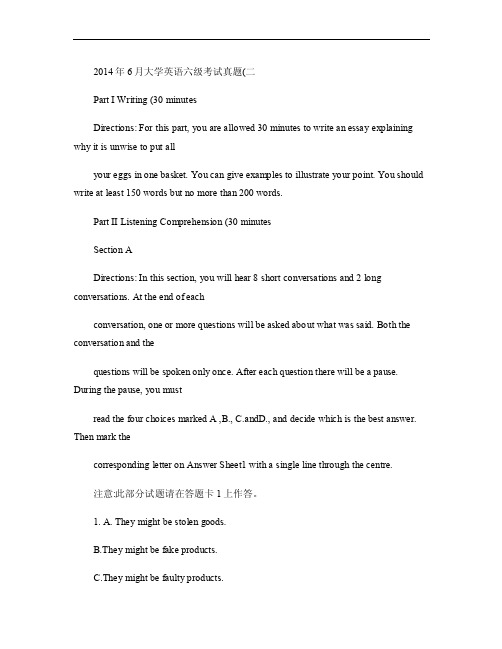
2014年6月大学英语六级考试真题(二Part I Writing (30 minutesDirections: For this part, you are allowed 30 minutes to write an essay explaining why it is unwise to put allyour eggs in one basket. You can give examples to illustrate your point. You should write at least 150 words but no more than 200 words.Part II Listening Comprehension (30 minutesSection ADirections: In this section, you will hear 8 short conversations and 2 long conversations. At the end of eachconversation, one or more questions will be asked about what was said. Both the conversation and thequestions will be spoken only once. After each question there will be a pause. During the pause, you mustread the four choices marked A ,B., C.andD., and decide which is the best answer. Then mark thecorresponding letter on Answer Sheet1 with a single line through the centre.注意:此部分试题请在答题卡1上作答。
2014.6四六级翻译大全
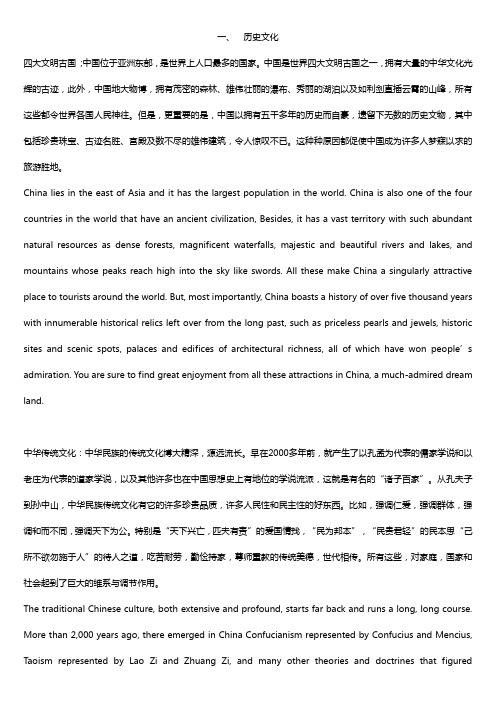
一、历史文化四大文明古国;中国位于亚洲东部,是世界上人口最多的国家。
中国是世界四大文明古国之一,拥有大量的中华文化光辉的古迹,此外,中国地大物博,拥有茂密的森林、雄伟壮丽的瀑布、秀丽的湖泊以及如利剑直插云霄的山峰,所有这些都令世界各国人民神往。
但是,更重要的是,中国以拥有五千多年的历史而自豪,遗留下无数的历史文物,其中包括珍贵珠宝、古迹名胜、宫殿及数不尽的雄伟建筑,令人惊叹不已。
这种种原因都促使中国成为许多人梦寐以求的旅游胜地。
China lies in the east of Asia and it has the largest population in the world. China is also one of the four countries in the world that have an ancient civilization, Besides, it has a vast territory with such abundant natural resources as dense forests, magnificent waterfalls, majestic and beautiful rivers and lakes, and mountains whose peaks reach high into the sky like swords. All these make China a singularly attractive place to tourists around the world. But, most importantly, China boasts a history of over five thousand years with innumerable historical relics left over from the long past, such as priceless pearls and jewels, historic sites and scenic spots, palaces and edifices of architectural richness, all of which have won people’s admiration. You are sure to find great enjoyment from all these attractions in China, a much-admired dream land.中华传统文化:中华民族的传统文化博大精深,源远流长。
2014年6月大学英语四六级翻译原文及参考译文
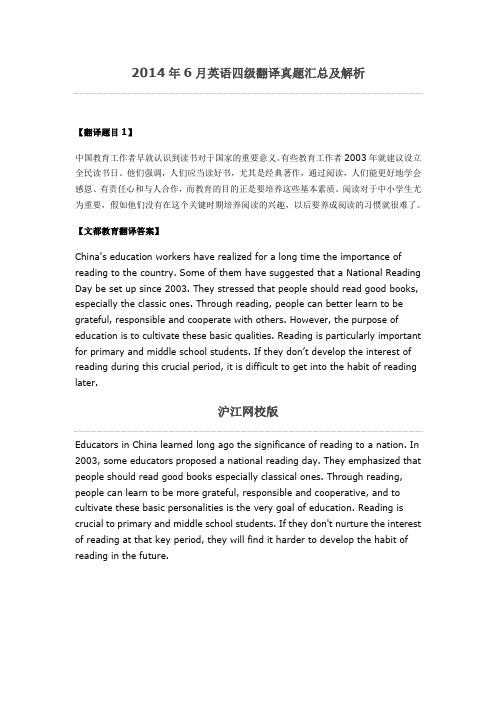
2014 年 6 月英语四级翻译真题汇总及解析【翻译题目 1】 中国教育工作者早就认识到读书对于国家的重要意义。
有些教育工作者 2003 年就建议设立 全民读书日。
他们强调,人们应当读好书,尤其是经典著作,通过阅读,人们能更好地学会 感恩、有责任心和与人合作,而教育的目的正是要培养这些基本素质。
阅读对于中小学生尤 为重要,假如他们没有在这个关键时期培养阅读的兴趣,以后要养成阅读的习惯就很难了。
【文都教育翻译答案】 China's education workers have realized for a long time the importance of reading to the country. Some of them have suggested that a National Reading Day be set up since 2003. They stressed that people should read good books, especially the classic ones. Through reading, people can better learn to be grateful, responsible and cooperate with others. However, the purpose of education is to cultivate these basic qualities. Reading is particularly important for primary and middle school students. If they don’t develop the interest of reading during this crucial period, it is difficult to get into the habit of reading later.沪江网校版Educators in China learned long ago the significance of reading to a nation. In 2003, some educators proposed a national reading day. They emphasized that people should read good books especially classical ones. Through reading, people can learn to be more grateful, responsible and cooperative, and to cultivate these basic personalities is the very goal of education. Reading is crucial to primary and middle school students. If they don't nurture the interest of reading at that key period, they will find it harder to develop the habit of reading in the future.【翻译题目 2】 为了促进教育公平,中国已经投入 360 亿元,用于改善农村地区教育设施和加强中西部地 区农村义务教育。
2014年6月大学英语六级真题及答案

2014年6月大学英语六级真题及答案2014年6月大学英语六级答案解析(233网校)作文整体解析:跟去年12月份的六级相比,作文难度依然保持不变。
这次六级作文的题目则中规中矩,同去年题材相似,都是引语论述题,这也是课堂上给各位学员重点强调的未来一段时间大学英语六级作文的命题方向,就是想办法拜托作文模板,考查考生的逻辑思辨和分析能力,进而考出考生真正的英语语言应用能力。
比如“Why is it unwise to jump into conclusions upon seeing or hearing?”很像辩论赛的题目,“是眼见为实还是眼见为虚”,结合社会现实和英语谚语“seeing is believing”,要透露出的信息其实就是“seeing is not believing”,扩展开来就是要通过大脑去分析。
如最近火热的文章和马伊利,表面上看起来是真爱,但是结果却令人叹息。
所以得到文章结论。
同理的还有“It is unwise to put all eggs in one basket.”。
而“It is unwise to judge a person by appearance.不要以貌取人”。
其实不管怎样出题,快速形成自己的观点,联系社会现实和考生自己总是其中不变的规律和大学四六级针对在校大学生的考试特点。
参考作文1:why it is unwise to judge a person by their appearance.There is a Chinese saying goes like this: men cannot be judged by their looks. I cannot agree with this point of view any more.On the one hand, though a charming appearance will leave a good impression on others, one’s look can seldom reflects his or her qualities, capacities and ethics. We cannot say those who are good-looking are more capable and more cultivated than those who are average-looking orugly-looking. There are so many people who do not have good appearances have made great achievements for the progress of mankind, such as Stephen William Hawking who are even crippled. On the other hand, our appearances are decided by our genes, which are inborn, while our qualities can be cultivated as we grow. We can enrich our minds by learning, but which cannot be reflected on the appearances.To summarize, judging people by appearance is unwise. Therefore I suggest that we should focus on one’s inner world rather than their appearance.参考作文1:As old people always put it, "Never judge a book by its cover." However, in most cases, we judge a person just by external appearances. For example, sometimes when we walk down the street at night, we choose to avoid people who are acting tough and loud. In this way we tend to make wrong decisions, because judging someone by appearance can be deceptive.In dairy life, we try to stay away from people who are called the "bad guy" because they dress a certain way. But we may miss an opportunity to make a good friend, because judgments based on external appearances prevent us from getting to really know a person. If we take the time to get to know the person, we might become friends.Therefore, in my opinion, judging people just by appearance is superficial and often unfair. After all, we don't know what circumstances the person might be facing or who the person really is. Please embrace everyone you meet and not judge him just by appearances.参考作文2:Why is it unwise to jump into conclusions upon seeing or hearing?Living in an age when the adolescents are lack of the necessary guidance and supervision, we cannever fail to figure out the fact that teenagers are become especially self-conscious. Under this circumstance, the youngsters are more likely to believe in what they have listened or seen instead of thinking twice before drawing their conclusions, which is pathetically and undoubtedly considered controversial or even unreasonable.The reasons why I insist on the viewpoint that we should never directly and irresponsibly come to conclusions only by listening or seeing mainly lie in the following two aspects. To begin with, it is a invariable law to every existence in the world that nothing will stay still even for just one second.So are the things happening around us. What we see or listen may be just some particular period of the development of things, which proves unstable and changeable. In addition, the perspectives we conclude just through seeing or listening are usually one-sided. Drawing conclusions rashly is not objective enough to make our statements persuasive.To sum up, it is unwise for us to define any thing as what we assume or imagine at first sight. Only by our serious thinking and accurate analyzing can we come up with more rational and reasonable conclusions.参考作文3:It is unwise to put all eggs in one basket.As a common saying goes,“It is unwise to put all eggs in one basket. ”Placing all eggs in one basket means focus all our attention on one thing and fix all our hope on one thing. However, It is wrong and reasonless.Why placing all eggs in one basket is wrong ? Placing all eggs in one basket tends to reduce the odds of success. By focusing on one thing , people will surely improve their efficiency and proficiency. However, they will also overlook other resources and possibilities,thus,the likelihood of success will be lower. Take Jack, one of my best friends, as a case in point: he started to hunt for jobs in his senior year. Compared with other students who chose different kinds of jobs, he aimed at state-owned firms alone. Unfortunately, getting a decent job in state-owned firms is really hard for him. At last, when others got a job, he was still on the way to his interviews. suppose he choose jobs in a wider range and “place all eggs in different baskets”, he could have gotten a job much easier.Putting all eggs in one basket in unwise, a truth which is applicable to many situations.As a college student,we should endeavor to master more skills, accumulate different experience and make friends with diverse people.选词填空:解析:其实,这种题型考查的内容无论如何变化,考生解题的思路和基本步骤仍然是不变的,即从文章整体意义把握、所填词项词性分析、所填词项语义分析和上下文逻辑语义分析等主要三个方面考虑。
- 1、下载文档前请自行甄别文档内容的完整性,平台不提供额外的编辑、内容补充、找答案等附加服务。
- 2、"仅部分预览"的文档,不可在线预览部分如存在完整性等问题,可反馈申请退款(可完整预览的文档不适用该条件!)。
- 3、如文档侵犯您的权益,请联系客服反馈,我们会尽快为您处理(人工客服工作时间:9:00-18:30)。
2014年6月英语六级翻译真题及参考译文:中国热词
来源:文都教育
【六级翻译真题原文】
中文热词通常反映社会变化和文化,有些在外国媒体上愈来愈流行。
例如,土豪和大妈都是老词,但已获取了新的意义。
土豪以前指欺压佃户和仆人的乡村地主,现在用于指花钱如流水或喜欢炫耀财富的人,也就是说,土豪有钱,但是没有品位。
大妈是对中年妇女的称呼,但是现在特指不久前金价大跌时大量购买黄金的中国妇女。
土豪和大妈可能会被收入新版的牛津(OXford)英语词典,至今约有120中文加进了牛津英语词典,成了英语语言的一部分。
【文都教育参考译文】
The Chinese hot words usually reflect the social and cultural change, some of them are increasingly popular with the foreign media. For instance, although the Tuhao and Dama are old words, they have acquired new meaning.
Tuhao (local tyrants) referred to the village landlords who oppressed the peasants and servants in the old days, but now it is used to refer to the rich who spends money like water or likes to showing off. That is to say, the local tyrants have wealth but no taste. Dama (aunt) is a calling to middle-aged women, but now it especially refers to the Chinese women who buy large amount of gold when gold tumbled recently.
These two words are likely to be include in the new OXford English Dictionary. Until now, about 120 Chinese word have added in the OXford English Dictionary, becoming a part of the English language.。
